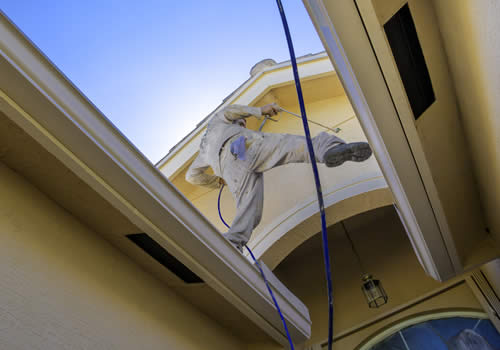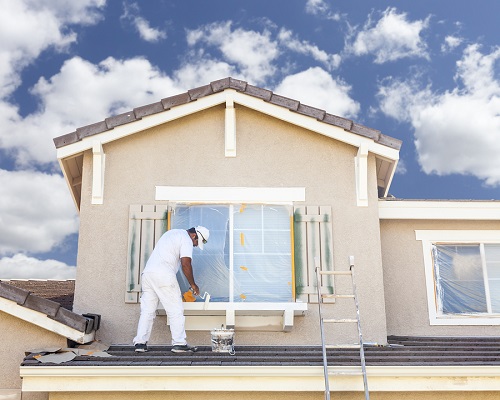What Is a Painting Contractor?
A painting contractor can work as a sub, or sub-contractor, under a general contractor, or can hire itself out directly to the homeowner. Usually, the painting contractor is a relatively small operation, ranging from the one-man sole proprietor up to 20 or 30 painters working for a small company.
How to Talk to Him
Unlike conversing with an electrician, you
do not need to know specialized lingo. Most house painting contractors are good
at making things clear to the homeowner.
A few topics you will want to discuss:
- Is the cost of the paint included in the estimate?
- What type of paint does the contractor intend on using?
- How many coats will be laid down?
- How will the non-paintable areas be covered for protection?
- How long can you the job to take?
- Is it preferable for the residents to vacate the house during the job?
- Will masking tape be used around the trim or the cut-in method?

How to find one?
Usually, a painting contractor tends to be local as of yet there are no national contractors. While the main task of the painting contractor is to paint but they also provide some other services such as exterior painting services, minor drywall work, molding, cleaning, wallpapering and so on.
Make sure you work with a professional
It might be tempting to save money by hiring a painting professional without licensing and insurances by state law. It will be backfired to receive an inferior painting job just to receive a refund. Make sure you receive a copy of the company’s business license as well as an insurance certificate. Make sure you don’t hire just anyone and you hire professionals to get your task done.
Compare at least three painting contractors
Most professional painting companies offer free estimates so don’t forget to ask the same from people. When you receive an invoice, make sure you ask about the policies of the companies. Compare all the policies as well as the quotes offered by the several exterior painting contractors and choose the right one from these.

How to Hire an Exterior Painting Company
Anybody can call himself an exterior house painter. While most states provide contractor licenses to various professionals, there’s no “seal of approval” that says a company is good at residential and commercial panting.
So what do you do when looking to hire a paint pro? Here are six important steps toward finding the right company for the job.
- Ask around. Do you know people who’ve used painting contractors for exterior work? Listen to what they have to say and make note of any glowing references you hear.
- Initial call. Your first call to paint contractors you’re interested in should be primarily to set up a face-to-face meeting. You can ask a few questions on the phone – Do you have crews available in August? How long have you been in business? – things like that, but save the important questions for the meeting.
- The meeting. Here you should make several evaluations. First, does the person who shows up seem to take his business seriously and demonstrate that your job is important to him? Initial impressions are often quite important in hiring an exterior paint contractor. However, don’t only go by how you “feel” about the person. Listen to what he says in answer to your questions and what he explains to you about the painting process. A solid professional will make you feel comfortable in the discussion while demonstrating experience and knowledge. Remember – you’re hiring a person (or team) to paint your house, not to attend your cocktail party.
- References. During the initial meeting, you should be provided with references from other customers in your general area for whom the painter has worked. The contractor’s website may also have some past-customer feedback. Follow up with these people.
- The estimate. You probably can get a general painting estimate over the phone, but getting a specific price for your specific job may not happen in just a few seconds. The contractor will want to look over the work areas, and you’ll likely have to answer a few questions before getting some numbers. Make sure you clearly understand what will be done for the price you’ll pay.
- Warranty and guarantee. Before agreeing to or signing anything, understand exactly what the painter promises to do and what your obligations will be during the process. Know what you’re getting and how any defects or damages will be compensated.

BONUS TIP – Negotiate for the Best Deal
Okay! You’ve done your homework and, by now, you’ve probably found the best painter in Tampa to paint your home’s exterior.
But Wait! Before you sign the proposal, I have another lesson from dad to share with you – “Never pay full price.”
Instead, always ask for a discount. Find a way to save money when you’re paying for something. But, be careful not to insult the service provider or you might lose the opportunity to have one of the best painters in Tampa to paint your home for the best value in town. Remember, value beats price, anytime.
Here are a few questions you can respectfully ask your painter to save a few bucks without hurting your relationship before the project even starts:
Ways to Save on the Cost to Paint
- Do you offer a discount if I pay with cash or check?
- Do you offer a (military, first-responder, teacher, senior) discount?
- Do you offer a discount if I get any of my neighbors to paint their homes at the same time you’re painting mine?
- Do you have any coupons in the local discount magazines that I can use? Or, do you take competitor coupons?
- I prefer to do business with you, but I have an estimate from a competitor that came in less than yours. Their quote looks pretty much apples-to-apples compared to yours. Would you be willing to match their price? Note: Usually, the best painting companies in town already advertise that they offer a price match guarantee. Just be prepared to show the other written painting estimate.
SPRAY PAINT VS. ROLLING PAINT: EXTERIOR PAINTING DILEMMA
Some painting companies spray the siding on houses while others brush and roll the paint on. I have had a lot of my homeowners ask me what the difference between the two are. Each of the two has its own advantages and disadvantages.
ROLLING
At textbook painting we normally roll the majority of our jobs because rolling jobs will give a higher quality finish. The advantages to rolling a house vs. spraying is that the paint will be applied much thicker giving overall better coverage than if it was sprayed. Also it is much easier to be precise and when a house is rolled it eliminates the risk of such things like overspray.
SPRAYING
We also spray some jobs for its primary advantage: speed. When we spray large areas it allows us to work much faster and produce a job much quicker. Since fewer labor hours are needed it costs me less to produce the job and I pass that savings on to my homeowners. So I normally write an estimate up with a price to have it sprayed with the additional option to have it rolled. Most of my homeowners end up going with the roll price because it is a higher quality job.